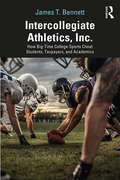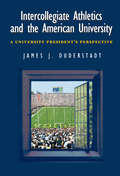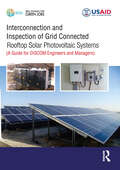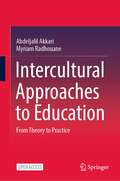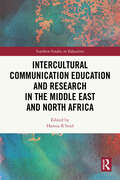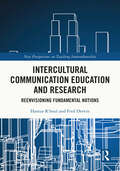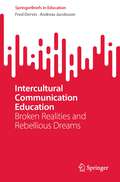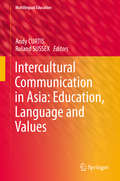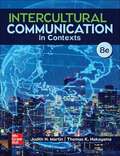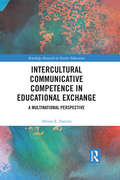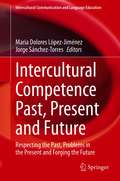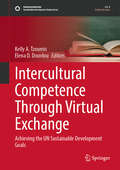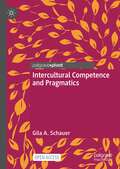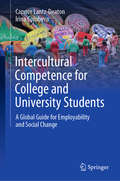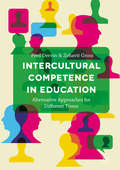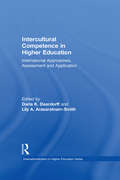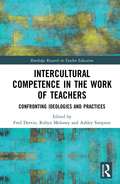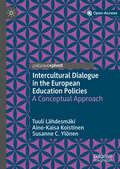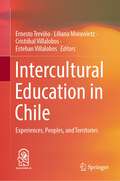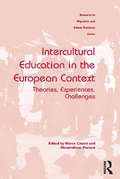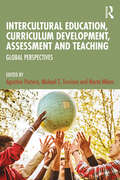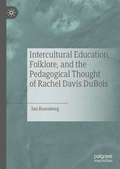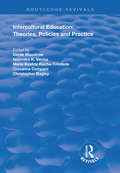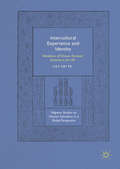- Table View
- List View
Intercambio en París (Best Friends Forever #Volumen 3)
by Ana PunsetUna amiga conoce todas tus historias, tu mejor amiga las vive contigo. ¡No te pierdas las aventuras de Best Friends Forever! Julia y Alejandra han demostrado que si están unidas pueden con todo, ¡y ahora tienen la oportunidad de disfrutar juntas de París! Pero el intercambio con un colegio de élite pone a prueba su confianza en sí mismas… y también su amistad. Es el momento de demostrar que siempre se tendrán la una a la otra, porque pase lo que pase son… Best Friends Forever
Intercollegiate Athletics, Inc.: How Big-Time College Sports Cheat Students, Taxpayers, and Academics
by James T. BennettIntercollegiate Athletics, Inc. examines the corrupting influence and damaging financial effects of big-time intercollegiate athletics, especially football and to a lesser extent basketball, on American higher education. Including historical and contemporary perspectives, the book traces the growth of intercollegiate sports from largely student-run activities supervised by faculty to the gargantuan, taxpayer-supported spectacles that now dominate many public universities. It investigates the regressive student fees that have helped subsidize big-time sports at public universities and prop up chronically unprofitable athletic departments, as well as the corrosive effects of athletics on the university’s academic enterprise. A review of the alleged salutary effects of massive sports programs, such as spurring alumni donations and student applications, reveals that such benefits are largely illusory, more myth than real. The book also pays special attention to the often prescient, if largely unsuccessful, opponents of these developments, and considers the alternatives to big-time athletics, from abolition to professionalization to club sports. Students, scholars, sports fans, and those interested in learning how big-time football and basketball have cast such an enormous—and often baleful—shadow upon American colleges and universities will profit from this provocative and engagingly written book.
Intercollegiate athletics and the American university: a university president's perspective
by James J. DuderstadtAfter decades of domination on campus, college sports' supremacy has begun to weaken. "Enough, already!" detractors cry. College is about learning, not chasing a ball around to the whir of TV cameras. In Intercollegiate Athletics and the American University James Duderstadt agrees, taking the view that the increased commercialization of intercollegiate athletics endangers our universities and their primary goal, academics. Calling it a "corrosive example of entertainment culture" during an interview with ESPN's Bob Ley, Duderstadt suggested that college basketball, for example, "imposes on the university an alien set of values, a culture that really is not conducive to the educational mission of university. " Duderstadt is part of a growing controversy. Recently, as reported inThe New York Times, an alliance between university professors and college boards of trustees formed in reaction to the growth of college sports; it's the first organization with enough clout to challenge the culture of big-time university athletics. This book is certainly part of that challenge, and is sure to influence this debate today and in the years to come. James J. Duderstadt is President Emeritus and University Professor of Science and Engineering, University of Michigan.
Interconnection and Inspection of Grid Connected Rooftop Solar Photovoltaic Systems: A Guide for DISCOM Engineers and Managers
by Tanmay BishnoiThe Government of India is aiming towards a capacity of about 100,000 MW Solar PV power plants by the year 2022. This will involve: 40,000 MW of rooftops 60,000 MW of utility scale ground mount Considering the huge requirement of rooftop solar-grid integration skills to meet this ambitious goal, the Skill Council for Green Jobs is targeting a special skilling course on Interconnection and Inspection of Grid Cnnected Rooftop Solar Photovoltaic Power Plants, which has been declared a National Qualification. This handbook deals with the subject of how an individual can carry out interconnection and inspection of a Rooftop Solar Photovoltaic System, which includes: Pre-commissioning Inspection of the Grid Connected Rooftop Solar Photovoltaic Systems Post-commissioning Inspection of the Grid Connected Rooftop Solar Photovoltaic Systems Maintaining Personal Health and Safety at the Project Site. Distribution companines, Solar Developers and EPC compaines, and other relevant stakeholders have provided their guidance and support in detailing the activities to be performed by the individual who checks, audits, inspects and tests different components of the grid connected Solar Photovoltaic Systems in compliance with all releveante codes, standards, and safety requirements, which has helped in the development of this manual and making it a practical guide.
Intercultural Approaches to Education: From Theory to Practice
by Abdeljalil Akkari Myriam RadhouaneThis open access book provides an analysis of contemporary societies and schools shaped by cultural diversity, globalization and migration. This diversity is necessarily reflected in education systems and requires the promotion of intercultural approaches able to improve learning processes and the quality of education. From an international and comparative perspective, this book first presents theoretical and conceptual foundations for seriously considering cultural diversity. The book also compares intercultural approaches and debates generated in countries as diverse as the United States, Canada, Brazil, Switzerland and France. For each national context, the book addresses both the historical roots of intercultural approaches and the concrete initiatives driven by educational policies for their implementation in schools and classrooms. Finally, the book presents discussions surrounding the treatment of linguistic or religious diversity in schools, the emergence of global citizenship education and the key role of teachers in intercultural approaches.This is an open access book.
Intercultural Communication Education and Research in the Middle East and North Africa (Southern Studies in Education)
by Hamza R’boulThis edited volume gathers insights into the production of knowledge about interculturality in education and research in the Middle East and North Africa (MENA).The MENA region is seen in this book as a space with unique circumstances, conditions and complexities that need to be thoroughly explored and further unpacked. The book defines intercultural communication education and research broadly, but focuses on how teaching and researching interculturality is understood and practiced in MENA formal education classrooms and in various training situations such as business, politics, media and communication. This edited volume aims to (a) navigate representations of intercultural communication in education and research, starting from the premise that interculturality is not only a theory of analysis but also an activism for social and epistemic justice, (b) investigate specific phenomena, challenges and issues in education and research, including concepts/notions such as acculturation and intercultural understanding/empathy, and (c) explore subfields of knowledge such as sense-making and intercultural pragmatics, and specific contexts of interculturality such as immigrants, exchange programs and student mobilities.This book will be valuable read for students, educators, scholars and policymakers interested in intercultural communication and education in the region, as well as language and sociology more broadly.
Intercultural Communication Education and Research: Reenvisioning Fundamental Notions (New Perspectives on Teaching Interculturality)
by Fred Dervin Hamza R'boulSeeking to uncover underlying epistemic invisibilities in generating intercultural communication education and research knowledge and to open up space for envisaging interculturality alternatively, this book reexamines and problematizes the assumptions and ontologies in the conceptual systems of interculturality. In enunciating and critiquing what has been largely endorsed, normalized and taken for granted, this volume brings to the fore different, changing and situated understandings of intercultural ontologies and epistemologies in terms of premises, workings and objectives, unveiling the entangled factors and contexts that have delimited and circumscribed the realm. The authors believe that the field would benefit from some cognitive and sensory dissonance while reengaging effectively with notions to move forward. In particular, they endeavour to de-monumentalize and disrupt the very conceptual tenets that may have rendered interculturality myopic, repetitive, monolithic and aseptic in expanding the epistemic concerns of the “intercultural”, especially in the English language. This book will be an essential read for scholars and students of the sociology of education, educational philosophy and intercultural education and also for all readers interested in the broad field of interculturality.
Intercultural Communication Education: Broken Realities and Rebellious Dreams (SpringerBriefs in Education)
by Fred Dervin Andreas JacobssonThis book explores the notion of interculturality in education and supports scholars in their discovery of the notion. Continuing the author’s previous work, the book urges (communication) education researchers and educators to 'interculturalize' interculturality. This book corresponds to the authors’ endeavor to complexify the way interculturality is discussed, expressed, (co-)constructed and advocated in different parts of the world and in different languages. To interculturalize interculturality is to expand the way we deal with the notion as an object of scientific and educational discourse, noting the dominating voices and allowing for silenced voices that are rarely heard around interculturality to emerge. This book is based on broken realities and (the authors’) rebellious dreams. As two researchers and educators with a long experience examining discourses of interculturality, this book represents the authors’ program for the future of intercultural communication education. The book is divided into three 'tableaus' (living descriptions) depicting today’s 'broken' realities of interculturality and two 'rebellious' dreams of what it could be in research and education.
Intercultural Communication in Asia: Education, Language and Values (Multilingual Education #24)
by Roland Sussex Andy CurtisThis volume presents in-depth studies on leading themes in education policy and intercultural communication in contemporary Asia, covering empirical as well as theoretical approaches, and offering both an in-depth investigation of their implications, and a synthesis of areas where these topics cohere and point to advances in description, analysis and theory, policy and applications. The studies address key questions that are essential to the future of education in an Asia where intercultural communication is ever more important with the rise of the ASEAN Economic Community and other international initiatives. These questions include the properties of the increasing globalisation of communication and how it plays out in Asia, especially but not exclusively with reference to English, and how we can place intercultural communication in this context, as well as studies that highlight intercultural communication and its underlying value systems and ideologies in Asia.
Intercultural Communication in Contexts
by Judith N. Martin Thomas K. NakayamaThis book examines communication in multicultural relationships and provides the tools for effective communication amid cultural, ethnic, and religious differences in domestic and global contexts. Students are introduced to the primary approaches for studying intercultural communication along with a theoretical and practical framework for applying the approaches in their own lives.
Intercultural Communicative Competence in Educational Exchange: A Multinational Perspective (Routledge Research in Teacher Education)
by Alvino E. FantiniThis book explores the nature of intercultural communicative competence (ICC), a set of abilities required to promote sojourner engagement with diversity during study abroad and other educational exchange experiences. A highly original contribution to the intercultural communication literature, this book bases its multinational perspective of ICC on an extensive literary search in six languages and spanning 50 years to identify ICC’s multiple components, to develop a comprehensive assessment tool, and to assess its development and impact on exchange participants in multiple countries.
Intercultural Competence Past, Present and Future: Respecting the Past, Problems in the Present and Forging the Future (Intercultural Communication and Language Education)
by María Dolores López-Jiménez Jorge Sánchez-TorresThis book explores the benefits of teaching reflection upon one’s own culture to develop intercultural competence and looks into the relationship between the proficiency level of the second language and the target culture. It introduces new debates on the concept of ‘critical cultural awareness’ in intercultural learning and teaching, for example the indiscriminate use of terminologies related to the idea of ‘intercultural encounters’. Also, it provides insight into the relationship between language and culture using a new tool such as the Autobiography of Intercultural Encounters through Visual Media. The presentation of different approaches, tools, barriers, educational and cultural realities, online intercultural exchange projects and concepts such as motivation, attitudes, stereotyping, otherization, and critical cultural awareness makes this book an excellent instrument not only for teachers but also for researchers, policy-makers and private and public institutions that want to explore culture and interculturality and to promote an intercultural competence and global citizenship among its learners / users / clients and / or an interculturally-oriented language education.
Intercultural Competence Through Virtual Exchange: Achieving the UN Sustainable Development Goals (Sustainable Development Goals Series)
by Kelly A. Tzoumis Elena D. DouvlouThis book addresses the importance of sustainability and environmental worldviews and the role of intercultural competencies in achieving SDGs acceptance and their effective implementation. Particularly since the pandemic, there is a growth in online education, and this offers opportunities for educators and students that can be exploited with a focus on sustainability. The book provides examples of virtual exchange including Global South and Global North with tools ranging from Project-Based and Community-Based Service Learning, Debates, Environmental Games and Simulations, Virtual Reality/Augmented Reality, and Accessibility and DEI issues. Additionally, issues of social justice and digital colonialism are a thread through several of the chapters. By providing a broad range of global learning experiences from scholars across several continents from various disciplines that include various post-secondary education based on tools and best practices, the book is a great resource to academics, researchers, and students on approaches to education that prepare the learner for praxis and effective implementation of sustainable solutions for their professional and social future perspectives. Chapter "How can we raise global citizens at home: Evidence from an intercultural virtual collaboration between the Netherlands and Japan" is available open access under a via link.springer.com.>
Intercultural Competence and Pragmatics
by Gila A. SchauerThis Open Access book examines the link between intercultural competence (IC) and pragmatics by asking frontline modern foreign language teachers in higher education teaching a variety of languages (e.g., Dutch, English, French, German, Italian, Spanish, Swedish) how they conceptualise intercultural competence and which skills, competences and knowledge they consider important in their teaching contexts. The data were collected with an online survey that focused on the relationship between intercultural competence and pragmatics.While international organizations such as the United Nations Educational, Scientific and Cultural Organization (UNESCO) or the Council of Europe (CoE) agree that intercultural competence should play an important role in education, it is not always clear what IC may encompass in specific teaching contexts and subject areas. Examining how modern foreign language teachers in higher education conceptualise intercultural competence and the value they attach as well as the attention they give to various areas of pragmatics in their teaching is highly important, since those language professionals may be the final teachers learners encounter during their formal foreign language education. They are therefore in a unique position to shape modern foreign language learners’ intercultural and pragmatic awareness, competence and skills.This book will be of interest to language professionals, modern foreign language teachers and teacher trainers, as well as students and scholars of applied linguistics, pragmatics, and language education.
Intercultural Competence for College and University Students: A Global Guide for Employability and Social Change
by Irina Golubeva Caprice Lantz-DeatonThis practical guide is a must read for students interested in developing the attitudes, knowledge, skills, and values that foster positive relationships with people from diverse cultures both within and outside of the workplace. It contains real-life examples from students drawn from the authors’ work across different countries. In an age of growing diversity and increasing global mobility, living and working with people from different cultural backgrounds is becoming the norm. To address this complex topic, the authors invite students to consider key questions such as: How do our cultural backgrounds influence our behavior towards others? What is intercultural competence and how can it help students to get along in work and life? How can institutions help students to develop intercultural competence? What does it have to do with topics like prejudice, discrimination, and racism? How can intercultural competence facilitate social change and help students to succeed in their careers?Written for students in any country and studying in any discipline, this book includes practical activities designed to help students to develop intercultural competence throughout their time at college or university. It is useful for students as an autonomous learning source, or as a resource for taught courses.Drawing on a comprehensive and rigorous knowledge of the field, the authors have written a thought-provoking analysis and a practical guide to understanding and enacting Intercultural Competence. I learnt from and admire their ambitious vision of the significance of intercultural competence for society and for the lives and careers of their readers.— Michael Byram, author of Teaching and Assessing Intercultural Communicative Competence, Durham University, UK This is a wonderfully readable book, which carefully and clearly explains the concept of intercultural competence, exploring its implications for addressing many of the most crucial issues facing the world today. Based on impeccable scholarship, and containing a wealth of practical activities, this book is highly recommended for students and interested laypeople alike.— Martyn Barrett, University of Surrey, UKAn exceptionally user-friendly and theory-informed guidebook that would not only benefit university students but anyone with an interest in intercultural communication. The book is second to none in terms of clarity of presentation and coverage of concepts, models and practical ideas relevant to intercultural competence for the contemporary society. —Anwei Feng, University of Nottingham Ningbo, ChinaAn essential handbook and excellent addition to conventional textbooks. Nuanced and down-to-earth explanations about intercultural communication which are accessible to everyone. Insightful explanations for educators and students alike. Easy to use self-study guide with thought-provoking exercises. This book has been long needed and has come at just the right time. --Ivett Guntersdorfer, Founder and Director of the Intercultural Communication Certificate Program, Ludwig-Maximilians-Universität München, Germany
Intercultural Competence in Education
by Fred Dervin Zehavit GrossThis book explores the concept of intercultural competence, focusing specifically on education. Intercultural competence can vary depending on the field of research or the context of application and has therefore developed over recent decades. As the world becomes increasingly global intercultural competence has become even more important but it is still not practiced satisfactorily. This book highlights views which are at odds with official and orthodox positions on intercultural competence to encourage fresh approaches to intercultural competence. It will be invaluable for researchers, practitioners and students interested in the global possibilities of education.
Intercultural Competence in Higher Education: International Approaches, Assessment and Application (Internationalization in Higher Education Series)
by Darla K. Deardorff Lily A. Arasaratnam-SmithIntercultural Competence in Higher Education features the work of scholars and international education practitioners in understanding the learning outcomes of internationalization, moving beyond rhetoric to concrete practice around the world. Devoted exclusively to exploring the central learning outcomes of internationalization efforts, this edited volume contains a refreshing combination of chapters and case studies from interdisciplinary and cross-cultural contributors, including: cutting-edge issues within intercultural competence development, such as intersectionality, mapping intercultural competence, and assessment; the role of higher education in developing intercultural competence for peacebuilding in the aftermath of violent conflict; facilitating intercultural competence through international student internships; interdisciplinary and cross-cultural contributions from over 19 countries including Japan, Russia, Serbia, South Africa, and Vietnam; the latest research and thinking on global, intercultural, and international learning outcomes, with a unique emphasis on newer voices. Intercultural competence has become an essential element in international as well as domestic education. This text provides the latest thinking and research within the context of internationalization, presents practical case studies on how to integrate this into the preparation of global-ready students and will be of interest to postgraduate students, international education administrators, and practitioners, as well as scholars and researchers in a variety of disciplines who have an interest in intercultural and global competence.
Intercultural Competence in the Work of Teachers: Confronting Ideologies and Practices (Routledge Research in Teacher Education)
by Fred Dervin, Robyn Moloney and Ashley SimpsonThis book critiques models of intercultural competence, whilst suggesting examples of specific alternative approaches that will successfully foster intercultural competence in teacher education. Bringing together diverse perspectives from teacher educators and student teachers, this volume discusses the need to move beyond essentialism, culturalism and assumptions about an us versus them perspective and recognises that multiple identities of an individual are negotiated in interaction with others. Intercultural Competence in the Work of Teachers is divided into four sections: critiquing intercultural competence in teacher education; exploring critical intercultural competences in teacher education; reflexivity and intercultural competence in teacher education; and indigeneity and intercultural competence in teacher education, providing a methodological approach through which to explore this critical framework further. This book is ideal for teacher educators or academics of education specialising in global education who are looking to explore alternative perspectives towards intercultural competence and wish to gain an insight into the ways it can be utilised in a more effective and productive manner.
Intercultural Dialogue in the European Education Policies: A Conceptual Approach
by Tuuli Lähdesmäki Aino-Kaisa Koistinen Susanne C. YlönenThis open access book analyses intercultural dialogue as a concept, policy and ideal in European education policy documentation. The core European transnational organizatons – the Council of Europe and the European Union – have actively promoted policies to engender inclusive societies and respond to challenges that diversification may entail. This book, in turn, offers suggestions for improving education policies in super-diversified Europe and beyond, where there is an increasing need for cultural understanding and constructive dialogue. The authors utilize concept analysis to reveal how these organizations seek to deal with dialogue between cultures, as well as weight given to cultural differences and intercultural encounters. This book will be of interest and value to scholars of intercultural dialogue and European education policies.
Intercultural Education in Chile: Experiences, Peoples, and Territories
by Ernesto Treviño Liliana Morawietz Cristóbal Villalobos Esteban VillalobosThis book examines the status of intercultural education in Chile. It does this through three axes: the first is multidisciplinary, including historical, anthropological, sociological, and pedagogical, to account for varied aspects of the Chilean intercultural education. The second is the consideration of multiple indigenous peoples, analyzing students’ groups or indigenous peoples, such as the Rapa Nui, Aymara, or Mapuche. Finally, the book has a multilevel perspective that recognizes that educational policy involves different actors, from the central government to local communities.The book incorporates study material enriched with the experience and analysis of different perspectives and methodologies of its authors, being useful for understanding intercultural education in the country. It is a versatile resource for understanding this topic, as well as a support for the development of programs and policies.Translation from the Spanish language edition: Educación Intercultural en Chile. Experiencias, pueblos y territorios by Ernesto Treviño, et al., © Ediciones UC 2017. Published by Ediciones UC. All Rights Reserved.
Intercultural Education in the European Context: Theories, Experiences, Challenges (Research in Migration and Ethnic Relations Series)
by Marco Catarci Massimiliano FiorucciThis book offers a comparative analysis of the intercultural theories and practices developed in the European context. Bringing together work on the United Kingdom, France, Germany, Italy, Spain, Greece, The Netherlands and Sweden, it examines specific approaches to intercultural education. Structured around a series of core questions concerning the main features of diverse groups of migrants present within a country and within schools, the major issues raised by scientific research on the presence of migrant students, and the adoption of relevant educational policies and practices to address these issues - together with examples of best practice in each case - Intercultural Education in the European Context explores the strengths and weaknesses of the intercultural education approach adopted in each context. Offering a broad framework for the study of intercultural education as adopted in European settings, the book highlights the contribution of education to the development of a fair, democratic and pluralistic Europe. As such, it will appeal to scholars and policy makers in the field of sociology, migration, education and intercultural relations.
Intercultural Education, Curriculum Development, Assessment and Teaching: Global Perspectives
by Michael S. Trevisan Agostino Portera Marta MilaniThis edited volume explores the specific ability of the school setting to promote intercultural education as an approach to address contemporary, societal issues of justice and social inclusion.Highlighting the importance of schools as one of the first areas where diversity is encountered and experienced, this book offers case study chapters on the most recent pedagogical approaches, research questions, and frameworks for intercultural education and teaching. To address these approaches, the book uses comparative studies, systematic reviews, case study analyses, and theoretical and conceptual discussions. Written by an international team of experts in the field, chapters address new challenges in curriculum development for intercultural education and illustrate innovative ways to provide instruction through the use of technology and the arts. Fusing conceptual and methodological approaches, the book examines interculturality and associated instruction within schools, further exploring the frameworks and methodologies that govern contextually based, culturally responsive education.Offering in-depth treatment of cutting-edge pedagogies used to teach interculturality in culturally diverse settings, this book will be of interest to educators, researchers, and students studying intercultural education and studies, multicultural education, and the sociology of education more broadly.
Intercultural Education, Folklore, and the Pedagogical Thought of Rachel Davis DuBois
by Jan RosenbergThis book provides a history of the Quaker educator and intercultural education pioneer Rachel Davis DuBois (1892-1993) that explores the period in which DuBois lived and the key works she created. The opening section establishes the disciplinary contexts of her work, education, and folklore, and the subsequent sections present DuBois' pedagogical methods as they were developed and exemplified by her programs. Throughout the narrative, Rosenberg includes reflections on her own experience as a practitioner of the intercultural and folklife education DuBois championed.
Intercultural Education: Theories, Policies and Practices (Routledge Revivals)
by Giovanna Campani Gajendra K. Verma Christopher Bagley Derek Woodrow Maria Beatriz Rocha-TrindadePublished in 1997, this volume is a result of a number of European Union and Council of Europe initiatives. The major stimulus came from an intensive course held in Lisbon in 1994 as part of two Erasmus networks exploring the nature of intercultural studies on a European-wide basis. Although the concepts of multiculturalism and interculturalism have frequently been discussed within a British context, this book draws on the interlocking and comparative persectives of specialists in education and teacher training in several European countries including Spain, France, Italy, Britain and the Netherlands. Educational policies and theories of identity are compared and there are special sections in multilinguism, teacher training, curriculum development, relationships between different ethnic groups and a vision of the future of intercultural education in Europe. The issues discussed in the book are significant in the development of modern societies as they seek to come to terms with the revolution in intercultural relations brought about by mass communications and global transport. The world is rapidly having to come to terms with cultural and social differences which can no longer be kept separate in their protective groups.
Intercultural Experience and Identity: Narratives of Chinese Doctoral Students in the UK (Palgrave Studies on Chinese Education in a Global Perspective)
by Lily Lei YeThis book examines the identity formation and negotiation of Chinese doctoral students in the UK, and the opportunity for self-transformation this experience offers. As the largest group of international students in the English-speaking world, Mainland Chinese students encounter a range of difficulties and prospects that may be relevant to the wider international student community. Using extensive qualitative and empirical data, the author explores the narratives of eleven Chinese doctoral students at two British universities through a sociological perspective. Balancing analysis with solid theoretical framework and the voices of the students themselves, the author moves away from essentialism and ‘othering’, instead shining a light on the effects of globalisation, internationalisation and recent policy strategies. This volume will be of interest and value to students and scholars of comparative and international education, identity formation, intercultural communication, the sociology of education and study abroad.

